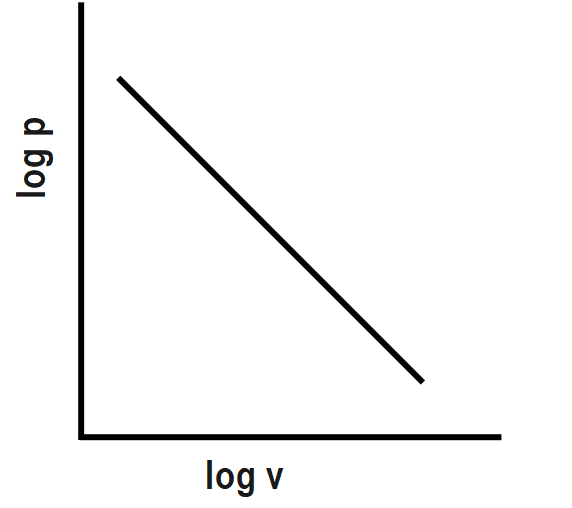Question
Question: The slope of the graph between \( \log p \) and \( \log V \) at constant temperature for a given mas...
The slope of the graph between logp and logV at constant temperature for a given mass of a gas is:
(A) +1
(B) −1
(C) 1/T
(D) 1/n
Solution
Hint : We know that according to Boyle’s law, for a given mass of a gas, the pressure is inversely proportional to volume occupied by that gas at a constant temperature. From this information, a relationship between logp and logV can be easily established for the given conditions. Formula Used: p1V1=p2V2 .
Complete Step By Step Answer:
According to Boyle’s law:
p∝1/V , for constant number of moles, n at constant temperature, T
We can say that, p=c/V , where c is a constant.
⇒pV=c (constant).
Taking logarithms of both sides, we get:
logpV=logc .
Applying the formula, logmn=logm+logn :
logp+logV=logc .
Rearranging the above equation:
logp=−logV+logc .
Here, logp and logV are variables and logc is a constant.
Comparing the above equation with y=mx+C , we get:
y=logp , m=−1 , x=logV and constant C=logc .
Here, m is the slope between the graph of y and x .
Therefore, the slope of the graph between logp and logV at constant temperature for a given mass of a gas is equal to −1 .
The following slope graph is given as:

Hence, option (B) is the correct answer.
Note :
Remember that Boyle’s law holds good for an ideal gas. Gases are at high temperature and low pressures behave near to ideal gas. Here, we have assumed that the given gas behaves as an ideal gas. Therefore, the required slope can also be found out by using the ideal gas equation, pV=nRT .
Taking logarithms of both sides, we get:
logpV=lognRT .
Here, n , R and T are constant, thus:
logp+logV=constant .
Rearranging the above equation:
logp=−logV+constant .
Hence, we get the same value of slope, m=−1 .
